Guide To Fishing for Catfish
Boat and bank fishing
Last updated on .
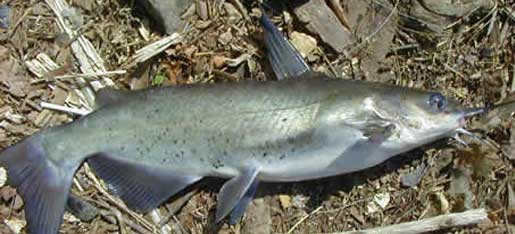
How To Fish For Catfish
Fishing for catfish is an art that requires a keen understanding of the fish's behavior. Target areas with cover and structure, such as submerged logs, rocky outcrops, boulders, creek channels and underwater vegetation. These habitats provide shelter and the ability to ambush prey. Additionally, catfish are known to congregate near deep holes, bends in rivers, and underwater channels. It's all about food and shelter for these big predators.
Best Tackle For Catfish Fishing
Whether you prefer spinning reels or baitcasting reels, be sure to use a stout, quality fishing rod. Medium-heavy or heavy action rods in the seven-foot range tend to be ideal. Most rod manufacturer offer rods specifically designed for catfish fishing. Spool your reel with 15-to-50-pound monofilament or fluorocarbon line. For big fish use 65-to 80 pound braided line.
Best Baits For Catching Catfish
When it comes to bait selection for catfish fishing, anglers have a wide array of options to choose from. Natural baits such as nightcrawlers, small fish, cut bait, chicken livers, or prepared baits can attract catfish from far distances. Bottom fishing with a slip sinker rig or a Carolina rig is the preferred method. Patience is important when catfishing, as catfish may take some time investigating before actually biting. Click here to see the top five catfish baits of all time.
Catfish Species
Fishing For Channel Catfish
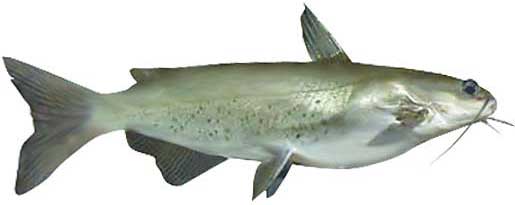
One of the most commonly found catfish species are channel catfish. Known for their voracious appetite and strong fighting abilities, channel catfish can be found in various types of fisheries. Anglers can fish most areas of a typical lake and expect to catch channel catfish. The best time of year tends to be spring and fall followed by summer and lastly winter. Click here for details on channel catfish fishing.
Fishing For Flathead Catfish

Flathead catfish are known for feeding in river systems, particularly in areas where rivers flows into a lake. They can grow to be giants, have a big appetite, and powerful fighting abilities. Focus on the river end of lakes, and up into the river itself. Look for any type of cover or channel swings that they can use to deflect current. Flatheads are often caught on bait like live shiners, live sunfish and chubs, and only occasionally on cut or prepared baits. They are the second largest of the catfishes and lie in cover to ambush prey. Prime fishing time for catching them is after dark. Click here for details on flathead catfish fishing.
Fishing For Blue Catfish
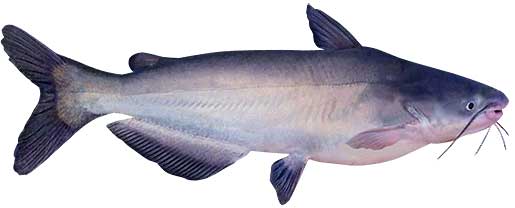
Blue catfish, prized for their size and fighting prowess, are a popular species among catfish anglers. They are typically found in larger rivers and reservoirs. They prefer deep, swift-moving waters with ample cover such as submerged logs, rock formations, and underwater ledges. Their feeding preferences lean towards live prey such as shad, sunfish, and other small fish. Anglers target them using live bait, cut bait, or even large artificial lures designed to mimic their preferred forage. They feed on fish, frogs, crayfish and large invertebrates. They find food primarily by using of their keen sense of smell. Look for them to be hiding in hollowed out logs or undercuts in structures. For bait, use anything from live shiners and sunfish, to cut bait and stink baits, to catch these big blue cats. Click here for details on blue catfish fishing.
Fishing For White Catfish
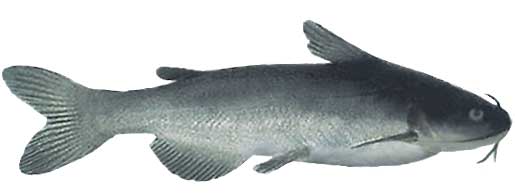
White catfish are a small species, compared to other catfish. They can be found in rivers and reservoirs. They thrive in areas with abundant aquatic vegetation, submerged logs, and other forms of cover, where they can ambush prey and seek refuge from predators. White catfish prefer slow-moving or stagnant waters in lakes or ponds, and sluggish rivers with muddy or sandy bottoms. They are occasionally found in brackish waters which drain into and mix with saltwater. Their primary diet is fish, however they also feed on aquatic insects, fish eggs, small crustaceans and even aquatic plants. Live minnows or worms during daylight hours is a great approach, as these are not as nocturnal as some of their relatives. Click here for details on white catfish fishing.
World Records For Catfish
Channel Catfish
Ictalurus punctatus
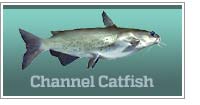
Prefers slightly stained to murky water with mild current and sand or rock bottom. Ideal water temperature: 65° to 90°
world record: 58 pounds, 0 ounces
Flathead Catfish
Pylodictis olivaris
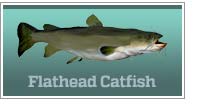
Prefers streams or large bodies of slightly stained to murky water with moderate current and hard bottom. Ideal water temperature: 75° to 84°
world record: 123 pounds, 9 ounces
Blue Catfish
Ictalurus furcatus
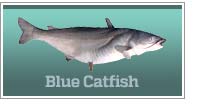
Found primarily in large river systems with deep current and swift channels. Ideal water temperature: 68° to 80°
world record: 143 pounds, 0 ounces
White Catfish
Ameiurus catus
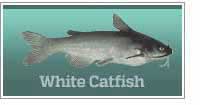
Prefers rivers and streams with slow moving current over muddy, sandy or even slightly silted bottoms. Ideal water temperature: 70° to 85°
world record: 19 pounds, 4 ounces
Catfish Fishing Video
Related Articles
Catfish fishing in your state
021326
Fishing Information


